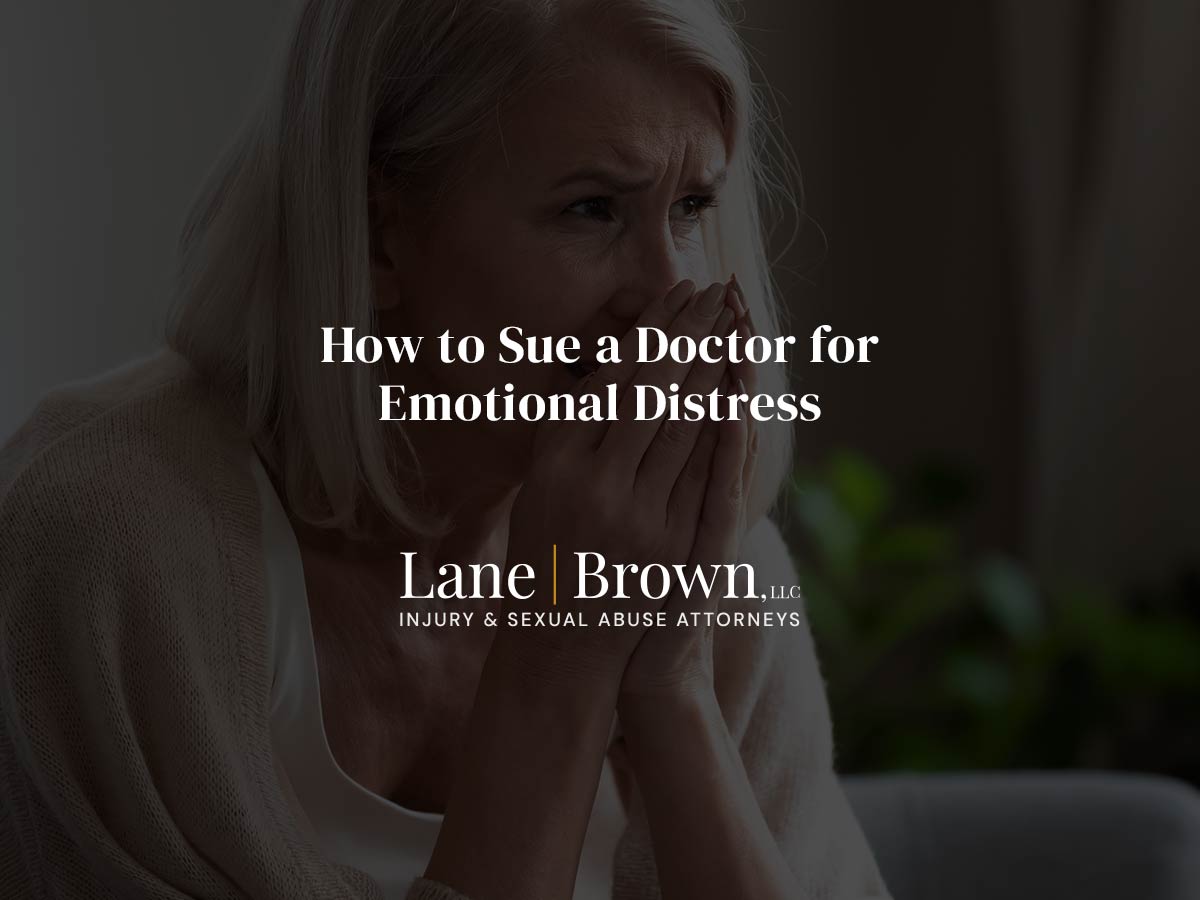There’s a time-honored expression that most are familiar with: “The devil is in the details.” Each case and each client brings their own special circumstances to be considered when we determine whether to take on a case, and then how we go about proving the case. On May 9, 2019, a driver (Defendant) was traveling southbound through a shopping center parking lot. The weather was clear, and the shopping center parking lot was busy with vehicles and pedestrians. The defendant was traveling through the shopping center’s busy main driveway when, without slowing down, she turned left down a row of parking stalls. In the process of her turn, the defendant struck our client (KB) with the front center of her vehicle as she was walking through the parking lot. KB was facing the defendant’s vehicle when the impact threw her backwards, causing her head and back to violently strike the parking lot’s asphalt surface.
The defendant told investigating officers at the scene that she never saw KB walking, admitted that she had struck KB with her vehicle, and admitted that the impact had caused KB to fall backwards and strike her head and back on the pavement.
When the EMS arrived to the scene, they found KB lying on the ground, experiencing pain in her head, back, and coccyx (tailbone). She was placed in an ambulance and transported to a nearby hospital.
Description of Injuries and Course of Treatment
As a result of the collision, KB suffered a transverse S4 sacral fracture with angulation, hematomas of her head and right arm, and other related injuries, including urinary retention due to decreased sacral nerve sensation and microcytic anemia. This resulted in sacral pain (around her tailbone) and an inability to empty her bladder since the occurrence. She also suffered from neck pain, hypersensitivity in the back of her head and sacrum, blurred vision and glare while driving at night, and intermittent headaches.
In the emergency department, KB underwent numerous radiology studies, but the ER doctors did not provide a specific diagnosis for her conditions, other than stating that her pain is “likely musculoskeletal in nature”. While she was in the emergency room, KB began to experience chest pain, and so she underwent a chest x-ray and EKG.
As instructed, KB followed up with her primary care physician. At that appointment, KB presented with hematomas (bruising) on her head and right arm, and reported having sacral tenderness and inability to empty her bladder since the occurrence. Her doctor ordered a sacral x-ray, which showed that KB had suffered a transverse S4 sacral fracture with mild angulation, and instructed KB to follow up with an orthopedist. KB followed her doctor’s instruction, and followed up with an orthopedic surgeon, who recommended she use a coccygeal pillow, continue pain medications, and instructed her to return in 6 weeks for new x-rays.
Along with her musculoskeletal pain, KB had not been feeling well the past couple days. While at her doctor’s office, she had a fever and was starting to have chills. A urine test revealed KB had an elevated white blood cell count, which is suggestive of infection. KB also told her that she was experiencing urinary frequency and urgency, which she’d had before the accident. Blood cultures established that KB had a bacterial infection of her blood, and she was admitted to the hospital. In the hospital, she began IV and oral antibiotics for a presumed urinary tract infection with instructions to call the hospital if she developed a persistent elevated temperature. KB was diagnosed with Pyelonephritis (a urinary infection that spreads to the kidney) and gram-negative bacteremia, and remained in the hospital until her discharge on May 23, 2019.
While she was in the hospital, KB was examined by a Female Pelvic Medicine and Reconstructive Surgery Fellow (Dr. B), specifically to evaluate her symptoms of urinary retention since the collision. Dr. B concluded that KB’s urinary retention was due to decreased nerve sensation resulting from the sacral fracture she’d suffered in the collision. Dr. B. further noted that as a result of the high-pressure of her retention and urination, infection-colonized urine spread to the kidney, which led to gram-negative bacteremia requiring hospitalization. KB followed up with a urogynecologist and pelvic surgery specialist one week after her hospital discharge.
Dealing with the Insurance Company
The insurance company recognized that the defendant had clearly been negligent, and that they should pay for KB’s damages. But, as always, the devil is in the details. While the insurance company appeared to be accepting responsibility, its adjustor argued that all of KB’s care after her initial hospitalization was not caused by the collision. Rather, they argued that subsequent care was related to whatever had been causing KB’s urinary frequency BEFORE the crash. Working with KB’s physicians, we were able to establish that the sacral fracture, which clearly resulted from the crash, had caused nerve damage that impacted KB’s ability to urinate. Before the accident, she had had an urgency, which caused her the need to urinate frequently. However. since the accident, she’d been unable to fully empty her bladder, and as a result of the nerve damage, this urinary retention, began causing recurrent urinary tract infections, which spread to her kidney. The nerve injury was felt to be permanent, and was projected to be a likely cause of urinary tract infections for the rest of KB’s life.
Since KB had been found to exhibit heart palpitations, supraventricular tachycardia, elevated liver enzymes, chest tightness and a worsening of her vision in addition to her musculoskeletal and urinary symptoms, her doctors ordered testing to determine the causes. We were able to establish the connection of that workup to the crash, showing that she’d had none of those issues before the collision, and her physicians determined that all of her complaints were either caused directly, or were aggravated by the crash.
We were able to show that the effects of the collision of Defendant’s car with KB’s body caused immediate and significant impacts upon her life. The collision continues to affect her emotionally. For several months, KB was frustrated, sad and weepy—depressed. She tried, but she could not force herself to feel better. KB had recently retired, just a month before she was injured, so it was a depressing way for her to start retirement. Her social activities were all cancelled. She spent most of her time just resting at home, trying to recover.
Long-Term Effects of a Pedestrian Accident
KB was severely limited in her ability to take care of her husband, who suffered from Parkinson’s Disease, and needed help with many activities of daily living. That was frustrating, and KB became angry at her limitations in being able to help her husband, who suffers several falls on most days. While KB’s children were very helpful during this time, KB could not escape the fact that she could not help her own husband when he needed her.
She was very upset that she could not be active and exercise as she had in the past. Before her injury, KB used to exercise several days each week, and worked with a trainer at the gym 2 days a week for many years. She was unable to have almost any physical activity for several months, and still has never been able to resume her previous level of exercise because her hip precludes any sustained exercise. For the first couple of months after the accident, KB was not able to do much of any of her normal activities. She spent the time largely on her couch.
For about a year after her injury, KB experienced flashbacks of the accident many times a day –She heard the sound of the car hitting her over and over again. She remains very anxious about cars and parking lots. The flashbacks were extremely upsetting and caused her a great deal of anxiety.
The cardiac-related symptoms KB experienced caused her additional anxiety. She worried that something more was going to happen to her, and became concerned about being well enough to be able to take care of her husband. Sometimes they continued to persist, sometimes for hours at a time, and so KB suffered both physically and emotionally.
With the attention to those ever-important details, we were able to show the insurance company that KB had sustained a head injury after Defendant’s car threw her backwards, knocking her off her feet, and forcing her to land on her back and head. She suffered head pain, headaches, nausea and mental fogginess which persisted for months. It also caused significant vision changes resulting in a new prescription for correction in June 2019. (Of note–KB had just had an annual eye exam in April of 2019 and had a new prescription then. She had to undergo a CT scan of her head on the day of accident as well as an MRI of her brain a couple of months after accident as a result of the vision issues.)
As a result of the impact, KB sustained a sacral fracture at the S4 level, which resulted in severe pain in her sacral area. For several weeks, KB could not sit or even lie on her back comfortably, and she had difficulty walking. That injury caused the cascade of events that resulted in septicemia, which in turn necessitated a week-long hospital stay. The sacral injury caused pelvic floor dysfunction, which caused urinary retention, resulting in pyelonephritis and septicemia. KB was hospitalized for IV and oral antibiotics, and had to be discharged with an indwelling IV for IV antibiotics at home for 14 days.
The sacral fracture also resulted in significant changes to KB’s bowel and bladder function as well as hip pain. Since her injuries, it has been hard for KB to empty her bladder. Urinating takes KB much longer than it did before the accident. She often has bladder pressure but that has improved with the pelvic floor physical therapy.
In addition to her bladder issues, KB also developed significant difficulty in emptying her bowel since the accident. This has resulted in a persistent issue of never feeling empty and constant rectal pressure. In an effort to address these issues, KB has been undergoing pelvic floor physical therapy which has helped, but her symptoms still have not resolved.
KB continues to suffer left hip pain. In addition to her medical care, she’s tried several home remedies for this pain–ice / heat, stretching exercises, etc., but none of those helped. When the “regular” orthopedic physical therapy was unsuccessful, KB began pelvic floor physical therapy, which significantly improved her hip pain.
KB developed episodes of chest pressure, shortness of breath, feeling her heart pounding, and a cough while she was hospitalized following the accident. She developed pulmonary edema (on chest x-ray and blood tests) and had an echocardiogram that showed moderate mitral valve regurgitation. She had never had any previous episodes of anything like this.
In the end, by gathering those important details of the actual mechanisms for each of the component injuries, working together with our client’s physicians and therapists, we were successful in convincing the adjustor to agree to pay the full amount of insurance overage available under the applicable insurance policy.
Contact a Chicago Pedestrian Accident Lawyer
If you were injured in a pedestrian accident, you deserve justice. Partner with a dedicated Chicago personal injury lawyer at Lane Brown, LLC. Call 312-736-0414 or fill out the contact form on this page.




